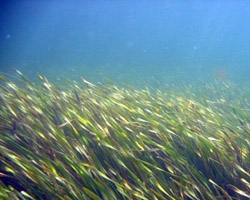Oceans Absorb Less Carbon Dioxide as Marine Systems Change

The oceans are by far the largest carbon sink in the world. Some 93 percent of carbon dioxide is stored in algae, vegetation, and coral under the sea. But oceans are not able to absorb all of the carbon dioxide released from the burning of fossil fuels. In fact, a recent study suggests that the oceans have absorbed a smaller proportion of fossil-fuel emissions, nearly 10 percent less, since 2000.
The study, published in the current issue of Nature, is the first to quantify the perceived trend that oceans are becoming less efficient carbon sinks. The study team, led by Columbia University oceanographer Samar Khatiwala, measured the amount of human-caused carbon dioxide emissions pumped into the oceans since 1765.
Industrial carbon dioxide emissions have increased dramatically since
the 1950s, and oceans have until recently been able to absorb the
greater amounts of emissions. Sometime after 2000, however, the rise in
emissions and the oceans' carbon uptake decoupled. Oceans continue to
absorb more carbon, but the pace appears to have slowed.
The reason is based in part on simple chemistry. Increased
concentrations of carbon dioxide have turned waters more acidic,
especially nearer to the poles. While carbon dioxide dissolves more
readily in cold, dense seawater, these waters are less capable of
sequestering the gas as the ocean becomes more acidic. The study
revealed that the Southern Ocean, near Antarctica, absorbs about 40
percent of the carbon in oceans.
"There are several factors that may be responsible for what's going on," Khatiwala said. "Increasing acidity is only one of them. Faster emission growth rate is another, perhaps more important, cause, as could be changes in ocean temperature and circulation."
Previous studies have attempted to quantify the carbon-storage potential of oceans by assessing the amount of natural carbon in the sea. Khatiwala's team chose not to measure natural carbon sinks, which he said are more difficult to assess globally.
The role of oceans, particularly coastal marine ecosystems, could become instrumental in mitigating climate change. These habitats have been overlooked by the policymakers who will meet in Copenhagen, Denmark, next month to develop a successor agreement to the Kyoto Protocol, according to two reports released this fall.
The carbon sequestration potential of tidal salt marshes, mangroves, seagrass meadows, and kelp forests combined "compares favorably with and, in some respects, may exceed the potential of carbon sinks on land," according to the International Union for the Conservation of Nature (IUCN), in a report released on Tuesday.
"If you look at the quality of carbon, compared to forests, you will find these habitats are 15 times more effective per unit area," said Dan Laffoley, vice chair of IUCN's World Commission on Protected Areas and an author of the report. "This has been a big wake-up call."
The United Nations estimated in a report released in October that 3-7 percent of current fossil-fuel emissions could be offset in two decades if more action is taken to prevent marine vegetation loss and degradation worldwide.
Currently, between 2 and 7 percent of coastal ecosystems are lost each year, due largely to runoff pollution and coastal development. In addition, fishing activities that trawl and dredge the seafloor often damage seagrass meadows, and aquaculture operations and timber extraction frequently lead to the destruction of mangrove ecosystems.
"We know that marine protected areas are beneficial for biodiversity," Laffoley said. "High levels of protection have carbon mitigation benefits as well."
These ecosystems are significantly understudied, however. Although global maps exist for seagrass meadows and mangroves, the global area covered by tidal sea marshes is unknown.
Khatiwala said that marine ecosystems could play a larger role in improving the oceans' ability to absorb carbon dioxide, but this role will likely remain minor compared to the huge carbon-sink potential of the ocean as a whole.
"Marine ecosystems are quite important. They take up carbon at the surface, and when they die they sink and take the carbon with them into the deep ocean. This is what is called the ‘biological pump,'" he said. "But this pump is still a small fraction of the dissolution of carbon in the ocean."
Ben Block is a staff writer with the Worldwatch Institute. He can be reached at bblock@worldwatch.org.
Worldwatch Institute - 1776 Massachusetts
Avenue, NW, Washington, DC 20036
Tel 202.452.1999 - Fax 202.296.7365 -
www.worldwatch.org